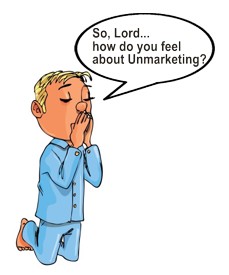 “UnMarketing? We don’t even have time for marketing!” True, these are tough times. For many Christian service nonprofits the clients and opportunities keep coming even when the support doesn’t. Might marketing be a solution? And just what is UnMarketing?
“UnMarketing? We don’t even have time for marketing!” True, these are tough times. For many Christian service nonprofits the clients and opportunities keep coming even when the support doesn’t. Might marketing be a solution? And just what is UnMarketing?
Actually, some nonprofits think marketing is a negative concept. “That’s for people with products… people who track sales… and think about customer satisfaction.” In fact, marketing is concerned with “creating, communicating, and delivering value to customers and for managing customer relationships.” As someone who has been involved with nonprofit organizations for over 22 years, I wonder if there might be a benefit to thinking of our donors as customers and our donations as sales? Are we obligated to ensure donor satisfaction? What would our donors say was our product — not the product we deliver to our clients, but the one we deliver to the donors themselves?
And what about UnMarketing? That’s the title of a book by Scott Stratten… “UnMarketing: Stop Marketing. Start Engaging.” Scott and a host of other marketing gurus maintain that there is a benefit to organizations from online engagement with their customers (think donors) through developing Internet content (in blogs, social media, and video sharing sites.)
A recent report by Network for Good tends to support the concept of UnMarketing for nonprofits. They found that “charity websites with a branded donation page received more donations (5x more!) and at higher average values than those with a generic donation page.” I took a list of sites suggested by Network for Good and found that 9 of the 10 sites they suggested as examples with branded donation pages were effectively practicing UnMarketing. Does the branded donation page make the difference or is it the nonprofit’s extra efforts at social engagement with their supporters?
Was my survey conclusive? No, but enough to make me want to try the concept with a few nonprofits operating in my area of interest and experience. Therefore, the purpose of this blog is to explore the practical application of UnMarketing by Christian service nonprofit organizations. Before we begin, here are a couple of underlying premises:
1. There is a path to developing devoted followers (I call them advocates.) The path involves introduction, education, identification, commitment, and advocacy. We will talk more about this process in a later blog post.
2. If a typical small to middle-sized nonprofit is going to be successful at UnMarketing, it must be done on a shoestring. Small to middle-sized nonprofits don’t have the time or budget to support an expensive experiment. At the nonprofit I’ll describe in my next post, our efforts to this point have all been done with volunteers.
3. Finally, I’m looking forward to your feedback in the comments section of these posts. I’m hoping that our conversations here will help us to become more effective UnMarketers for our causes.
